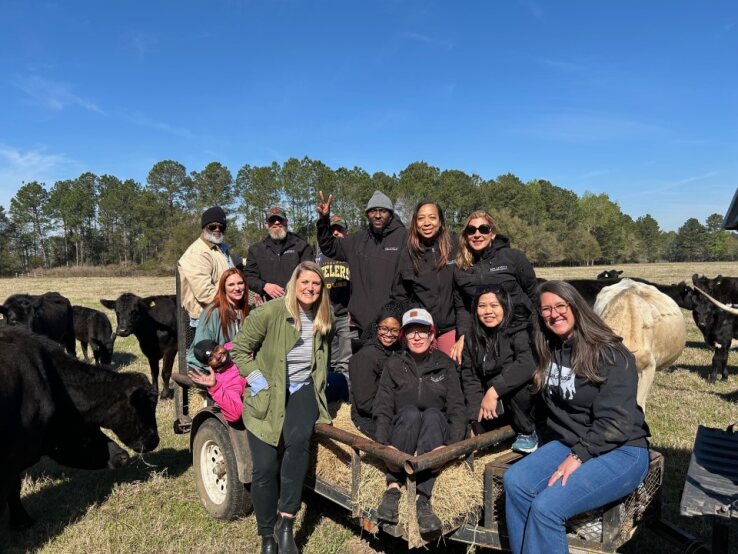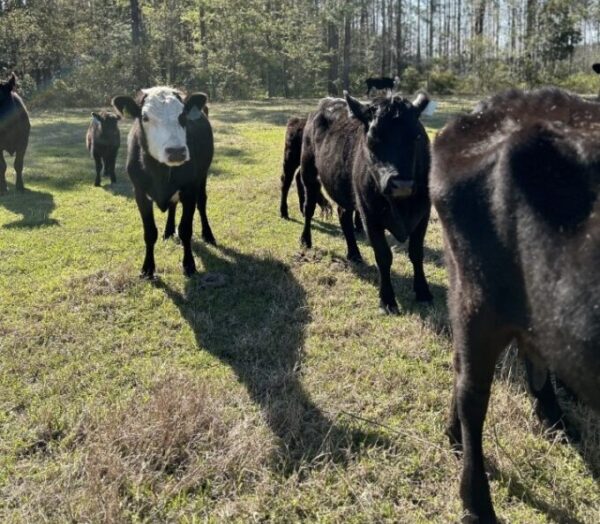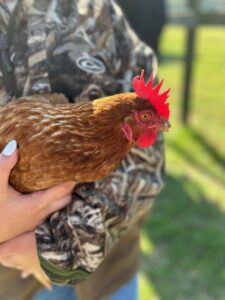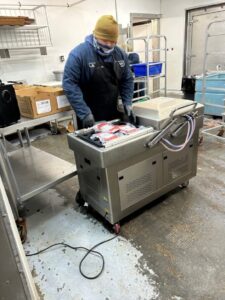Farm to Fork Profile: Hunter Cattle and Savannah College of Art & Design
- by Elise Dudley

The SCAD team with the cows at Hunter Cattle Company
This spring over a dozen chefs, managers, and team members from Bon Appétit at Savannah College of Art & Design (SCAD) traded their chef coats for muddied boots to learn how a humane burger gets raised. The culinary team headed just outside of Savannah to Brooklet, Georgia to learn firsthand about a longtime Farm to Fork partner whose grass-fed and grass-finished beef is served across campus.
Hunter Cattle Company is a multi-generation family-run farm, that was started “by accident” but has since flourished into a thriving and beloved producer in the region. Del Ferguson first ventured into raising cattle for his family. At the time, he had no idea that grass-fed beef would be desired by the community, much less marketable.
The family was originally in the real estate industry, but when the market crashed in 2007, they took a financial hit, losing two-thirds of their 900 acres of land. They took this as an opportunity to refocus on their farm business and decided to invest their remaining money into fencing and grass, the foundation for “rotational grazing.” The family possessed no knowledge of agriculture or raising livestock and Del’s daughter Kristan is quick to share that they owe their success to “good books, good neighbors, and the good Lord.” The farm is now run by parents Del and Debra Ferguson, their son Anthony Ferguson, and their daughter Kristan Ferguson Fretwell.

Cows on grass!
The Farm to Fork Connection
Bon Appétit at SCAD has proudly worked with Hunter Cattle for seven years now, whose dedication to sustainable practices and high animal welfare has made them a wonderful partner. As they began to establish their farm, the family was determined to do so in harmony with their landscape and ecosystems. Hunter Cattle is committed to never using antibiotics, hormones, GMOs, or steroids in the raising of their cattle, hogs, and chickens. They don’t raise food in a way that negatively alters the land or poorly affects neighbors or our bodies. Rather, they raise their livestock and tend to their land in a manner that celebrates and leverages natural systems and have never used chemicals or confinement to protect the animals or grow their grasses.
How is farming with such principles possible? They let nature do its thing. Honeybees help to pollinate their grasses and their free-range chickens feast on bugs, grass, and grains. Donkeys protect the herds from predators, allowing them to always be on pasture. Pigs are raised under the shelter of woodlands foraging on vegetation and bugs off the forest floor. Cattle rotate through different paddocks of pasture allowing cows to naturally fertilize the soil as they move to new green fields. All these pieces fit together to shape a farm ecosystem that mimics nature and produces healthy and nourishing food.

Chickens are part of the biodiversity mix at Hunter Cattle.
Hunter Cattle has steadily grown each year, and their beef is now even being served in local Georgia school districts, thanks to burgeoning farm-to-school funding. When supply chain disruptions occurred during the pandemic, Georgia consumers turned towards local farms, and the community around their farm grew significantly, helping to put Hunter Cattle on the map as a reliable and sustainable producer. The farm’s relationship with Bon Appétit at SCAD General Manager Dusty Grove is also long-standing — Dusty helped to build the flavor profile for Hunter Cattle’s award-winning Georgia sausage.
Moo-ving on Up
With 20 years of raising cattle under their belt, their family has grown alongside their business, now three generations deep. Due largely to the strong partnership between SCAD and Hunter Cattle, as well as growing demand from the community, the farm is upgrading to a new, 40,000-square-foot processing facility with a slaughterhouse, expanded freezer and refrigeration space, and more processing space — quadrupling the size of their current facility. The chefs at SCAD who recently spent the day touring the farm are especially excited about the new, state-of-the-art show kitchen!
The new barn and processing facility will not only dramatically expand Hunter Cattle’s processing abilities, but they will also begin slaughtering their cattle on-site as well as other small farmers’ cattle nearby instead of having to drive hours to the nearest facility. In the United States, there is already a lack of robust small and mid-sized processing facilities, and the number of slaughterhouses has significantly decreased in recent decades. In 2019, the 12 largest plants accounted for 52% of the total cattle slaughter in the country and the pandemic put immense stress on this link in the food processing chain. The result of such consolidation and scarcity is that farmers are forced to travel long distances to processing plants and small producers have greater difficulties accessing the market. This component of Hunter Cattle’s new facility will have a significant effect on their business and the local farming community.

Making meat patties
“Working with SCAD has been huge for us,” says Larry Stewart, a sales manager at the farm. “We’ve increased our wages, the number of workers, and our processing machinery… we used to make meat patties from scratch and now we have a machine to do that!”
The family’s relationship with SCAD also runs deep. Back in the early days of their business, a cohort of SCAD brand design students partnered with the family to help them develop a mission statement, brand image, and logo that is still used today. Kristan emphasized how special of a gift this was to the farm saying that prior, “we had never even thought to write a mission statement.”
Bon Appétit at SCAD is a proud partner of Hunter Cattle Company. Beyond serving their grass-fed beef on campus, students and guests can also purchase Hunter Cattle beef tallow soap, jerky, and spices in campus C-stores. “Partnering with SCAD has had a tremendous impact on our business,” says Kristan.